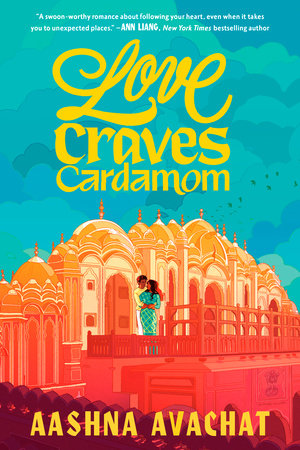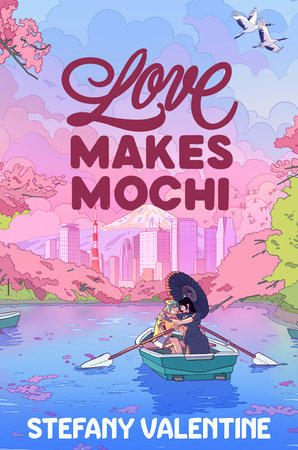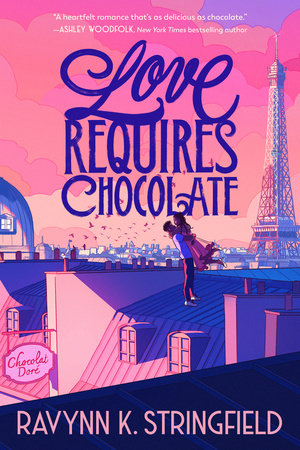Excerpt
Love Craves Cardamom
Chapter 1
Boy-Free January
Holy hell, I never knew I could be this jet-lagged.
Twenty-two hours from the airport in Washington, D.C., to Delhi, India, then two nights at a family friend’s home, and now a long train ride to Jaipur, Rajasthan. If I fall asleep and miss my stop, my mother is going to kill me. And I wouldn’t even blame her.
It’s not that I’m not excited about heading to Jaipur. I’ve been texting one of my best friends, Whitney, a new photo every two seconds--a green-and-yellow sign with the name of the station painted on it, the farmland we pass, the metropolis disappearing behind me . . . I stifle a yawn. At least I’m nearing the end of the journey. Any longer and I’ll show up in Jaipur looking like a zombie.
I stare out the window, focusing on the beautiful mountains in the distance to stop myself from nodding off. Thankfully, there aren’t that many people on the train, since the early morning commuter rush is over.
I’m on my own for the first time, and it’s so different from all the family trips we took when I was a little girl. Mamma grew up here, though her family is from Pun-jab; Baba met her while he was here for work.
Memories wash over me of Mamma and Baba, always with a packed itinerary: countless visits to see their old friends, meetups with distant relatives who barely knew my name, poojas in temples and at neighbors’ homes, shopping trips to get all the Desi things we couldn’t get in D.C., and, most important, revisiting the place where my parents fell in love.
But I haven’t been back in years. This time, I get to call the shots. I get to experi-ence my parents’ country, my homeland, on my own terms.
My phone vibrates, signaling a bunch of messages in the group chat with my par-ents:
Mamma: Everything okay? Send a thank-you text to Sharmila Aunty and Rajesh Uncle for taking care of you during your first few days in India.
Make sure you keep a close eye on your purse.
Did you map out the way to campus from the train station? Do you need to take rickshaw?
I roll my eyes but smile at the barrage of texts from my mom. If anyone has any questions about where I get my extreme Virgo-ness, they just have to meet her. I use one hand to toy with my nose ring while I type with the other.
Archi: I have all my things, and campus is super close to the station. And I already texted them. Don’t worry! I’ll be fine!
Mamma: So glad you chose to study in Jaipur.
I tuck my phone away. I’m glad too, but this wasn’t the original plan. My school, Odyssey Global High, requires students to study abroad for a semester, so I always knew I’d travel. But if you’d asked me a year ago where I’d be studying as an ex-change student, I would have said with the confidence of a madly-in-love, delu-sional girl, “London, with my boyfriend.” After all, in the winter semester of ninth grade, when I started dating Nick, we decided we would go to London together during the fall semester of our senior year.
Well, I mean . . . he decided.
And considering how I’m sitting on a train to Jaipur, about to spend my last semes-ter of high school at Vidyadhar Bhattacharya International School, also known as VBIS, it’s pretty obvious that plan didn’t work out. The tale’s as old as time: Girl likes boy. Boy likes girl. The summer before senior year, boy tells girl he has to fo-cus on his college apps and no longer has time to put in the effort a relationship requires. Girl tells boy, “What effort are you talking about? I planned every single one of our dates!” Boy shatters girl’s heart, making her question whether he ever really cared about her. Classic.
After Nick and I broke up, everything changed. No more London. No more boy-friend. I grit my teeth, reminding myself that this semester isn’t about any of that.
This semester is a Nick-free zone.
In fact, it’ll be a boy-free zone.
This semester will be strictly about Archi Dhawan.
The door to the train car opens, and the ticket collector walks in. “Ticket, ma’am?” he asks, giving me a once-over. I present it to him, my first purchase in rupees. “Chai service will begin soon,” he says.
As he moves on to the next passenger, I wonder what he saw when he walked up to me. He spoke in English, not in Hindi. Did he do that because he could tell I’m American? I’m dressed in Indian clothes--a kameez blouse in pale green, matching embroidered pants, my favorite gold nose ring. And, well, I am Indian. Nobody at home would deny it--in fact, in the States, I feel as if some people see that I’m In-dian before they see anything else about me. Here I worry it’s the opposite: that people will be able to tell right away that I’m an outsider. That while my roots are Indian, I’m not from here. That the moment I speak, my Americanness will jump out and be the thing they fixate on.
But I tell myself that, at first glance, people won’t know. I spent enough summers in Jaipur as a kid in the humid monsoon season, running up to the rooftop of my grandparents’ house, feeding the cows on the street vegetable scraps from our cooking. We didn’t visit for many years after my grandparents passed, but when I found myself without a study-abroad destination after the breakup and it was too late to join Whitney in Paris, I dug through the online brochures and found one with Jaipur on the cover page.
Suddenly, everything clicked into place.
Desi families, especially my own, love astrology, and for a moment I thought, This is why the universe meant for Nick and me to break up: so I could go back to the place my family once called home and get a fresh start.
Sometimes, when I make decisions, I picture an angel on one of my shoulders and a devil on the other. They argue, and it helps my brain sort through choices. The night I chose to go to Jaipur, the angel said, In India, you could learn so much about who you are! The devil said, You could get revenge on Nick by having a way better study-abroad experience than he does! At the end of the day, they were both saying yes.
I unzip my backpack and pull out the welcome packet Odyssey gave us during the study-abroad orientation, along with my journal-sketchbook, which is stuffed with papers I haven’t yet glued down. If I’m going to force myself to stay awake, I may as well be productive.
I run my fingers across the cover of the eight-by-twelve book, my most prized pos-session. I’m on my third one now, having filled two others since I started high school. It’s full of diary entries, Polaroids, receipts from cool places I’ve been to, and doodles in the margins. It’s my memory storage, to-do list, and dream journal all in one.
I spread out my things on the table in front of me. Carefully, I paste my boarding pass onto the top of a fresh page. Below it, I write Museum Internship Capstone Project. Rediscovering myself post-breakup is actually the second priority for this trip. The first is my final, semester-long Capstone project.
Whitney did hers in the fall, and being the creative she is, she wrote, directed, and performed a one-woman play. She got an A. The thing is, I’m not a creator. I’m a curator.
Back when I was still planning on going to London, I intended on doing a curatorial internship at a museum there for class credit. I’ve always had an eye for art, what with Baba taking me to all the free D.C. art museums every weekend when I was growing up. We still go to the Renwick Gallery to see new exhibits, and I always find myself marveling not only at the art itself but also at the selection. Who de-cides what gets shown? Who decides how pieces fit together like a puzzle? Who decides which artists to feature and when to change the trajectory of an exhibit to be more risky or more political or to make a statement?
I want the answer to those questions to be me.
Curators are gatekeepers, which means they have a lot of power. I want the chance to use that power to bring more exposure to the kinds of artists I care about, the kind who often don’t get to see themselves in mainstream museums. Street artists, fashion designers, digital creators. I haven’t yet decided exactly what I want to do for my Capstone project, but I want it to say something about art his-tory, the choices museums make, and my own curatorial vision. I want to do some-thing big.
“Chai?” a woman asks from the aisle, and I jump at the sound.
I order a Kashmiri chai in practiced Hindi. My parents taught me Hindi before I ev-er learned English, and I still speak it at home, though sometimes, admittedly, it’s more like Hinglish.
When she hands me the drink, I inhale the steam dancing out of my cup. It smells like home, like Mamma’s mix, and it tastes even better, though I’ll never tell Mamma that. Once I feel the caffeine entering my bloodstream, I get back to brainstorming. The new page in my journal fills up with notes and sketches: a bul-leted list of contacts to reach out to, different artists I’m inspired by, a doodle of a train on rounded tracks so my fingers can keep moving while I think about my plans.
I’m still doing a museum internship, as I’d planned for London, only now it’ll be at the Rathore Gallery, which is part of the Maharaja Sawai Man Singh II Museum in Jaipur. It was tough finding an opening at the last minute, and I had to beg my art teacher at Odyssey to write me a last-minute recommendation letter. Thankfully, the scrambling paid off. I’ll be starting there next week, shadowing curators, learn-ing about Indian artistry.
I flip a page in my journal while sipping my chai. In the corner, I glue down my of-fer letter from the museum, the “Congratulations!” a motivating reminder that I’m lucky I have this chance--and I need to make the most of it. I sketch an empty museum exhibit under the letter, frames yet to be filled with art. I’ve just started filling in the sketches with my favorite watercolor pens when four things happen:
1. The door opens from the first-class train car, where I imagine they have beds and spa treatments.
2. Someone walks in.
3. The train jolts as it rounds a curve in the tracks, sending my things flying.
4. My journal falls to the floor, landing in front of a pair of very expensive shoes.
I follow the shoes upward, taking in a guy about my age--tall, with wavy black hair falling in a swoop across his forehead, full lips with a perfect Cupid’s bow, and a small, crescent-moon scar on his chin.
I'm suddenly wide awake. He’s the first person my age I’ve seen since I got on the train.
This boy is dressed up, having decided against the usual bro-shorts-and-hoodie combo. He’s wearing a black suit jacket, buttoned up, with--I can’t believe this--a silky pocket square folded perfectly at his chest. I’ve never seen a boy my age wear a pocket square. This guy is put together, classy, and . . . oh . . . oh no. He’s cute.
I blink. Boy-free zone, Archi!
The angel on my shoulder nudges me disapprovingly. The devil on the other side rolls her eyes. Boy-free doesn’t mean you can’t acknowledge someone’s objective hotness, she says.
She has a point.
The boy looks like he should be on the cover of Teen Vogue India. Like the kind of guy I would have had a celebrity crush on in middle school.
He looks like a guy I would have a crush on now.
Okay, even I’ve gotta say this is going beyond just acknowledgment, the devil says.
“Knock it off,” I mutter to myself.
“What was that?” he asks, his right eyebrow lifting in confusion.
The question snatches me back to the moment. I’ve been staring at the boy for far longer than is socially acceptable. My cheeks flush, and I’m ready to be called out, but the guy isn’t even paying attention to me.
He’s picked up my journal and is thumbing through it, a crease forming between his brows, which are thick and dark. I wonder if he gets them threaded, then--“Hey!” I say indignantly, reaching for my book. “That’s mine.”
Our eyes meet. His are a light brown, and a surprised smile flits across his mouth. “Sorry.” He hands me back my journal. “I was admiring your work.”
Oh. I take the book from his hands. “Thanks.”
“The MSMS II Museum, is it? Planning to visit?”
A gentle accent softens his words, but I bristle. So he’s guessed right away that I’m not a local.
“No.” I clutch the book to my chest and frown. “I’m working there.” I lift my nose into the air, trying to appear confident.
“Oh? As an American?”
“How’d you know?” My frown deepens into a scowl. Is there really a sign above my head, visible only to locals, that says CLUELESS AMERICAN HERE!? I know the repu-tation NRIs--nonresident Indians--have in India, and I don’t want it to be associated with me. I’ve heard enough from my cousins on my dad’s side. According to them, I’m an ABCD--American-born confused Desi. But I don’t like how that feels. I want to be as Indian as the rest of them, even though I know our experiences are super different.
The boy smiles, seemingly amused. “You have a very strong accent.”
Of course. Here I am, embarrassed again, and forgetful, as Americans often are, that we too have accents. I blush. “Right. Sorry.”
“Nothing to be sorry about,” the boy says. “Now, if you were British, that’d be a different story. I might expect an apology then.”
A surprised laugh bubbles out of me at the quip about British colonialism, and he holds out a hand. “I’m Shiv.”
“Archana,” I say. “But I go by Archi.”
His eyebrows go up. “You don’t like your given name?”
“Excuse me?”
“You’ve made it more American.”
I realize what he’s insinuating. “I love my name. My parents gave it to me. They also gave me the nickname, which makes it feel more personal. And what about your name?” I challenge. “Shiv sounds like it’s short for something too.”






